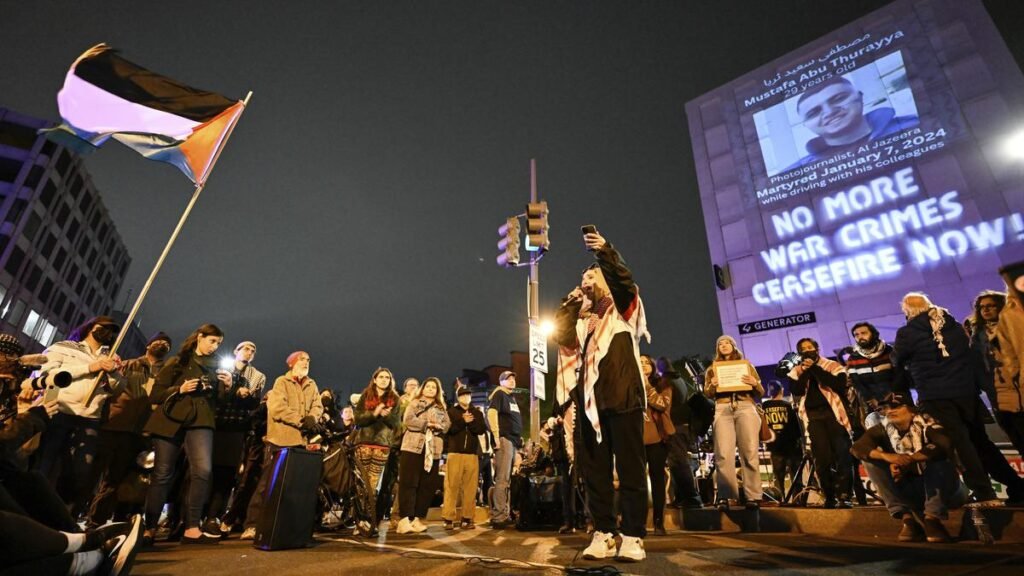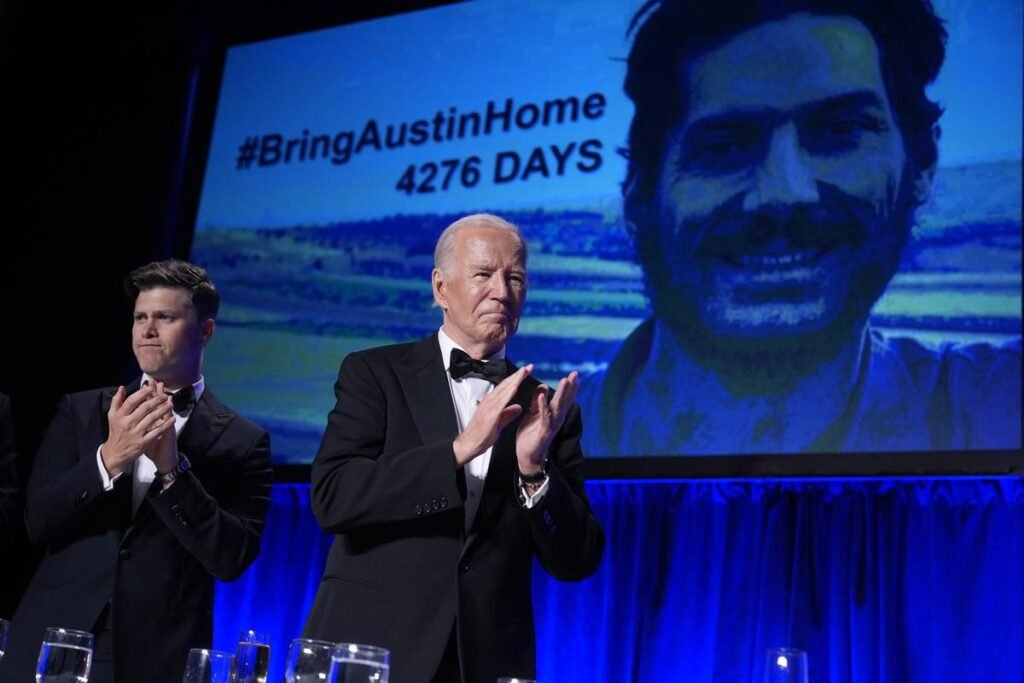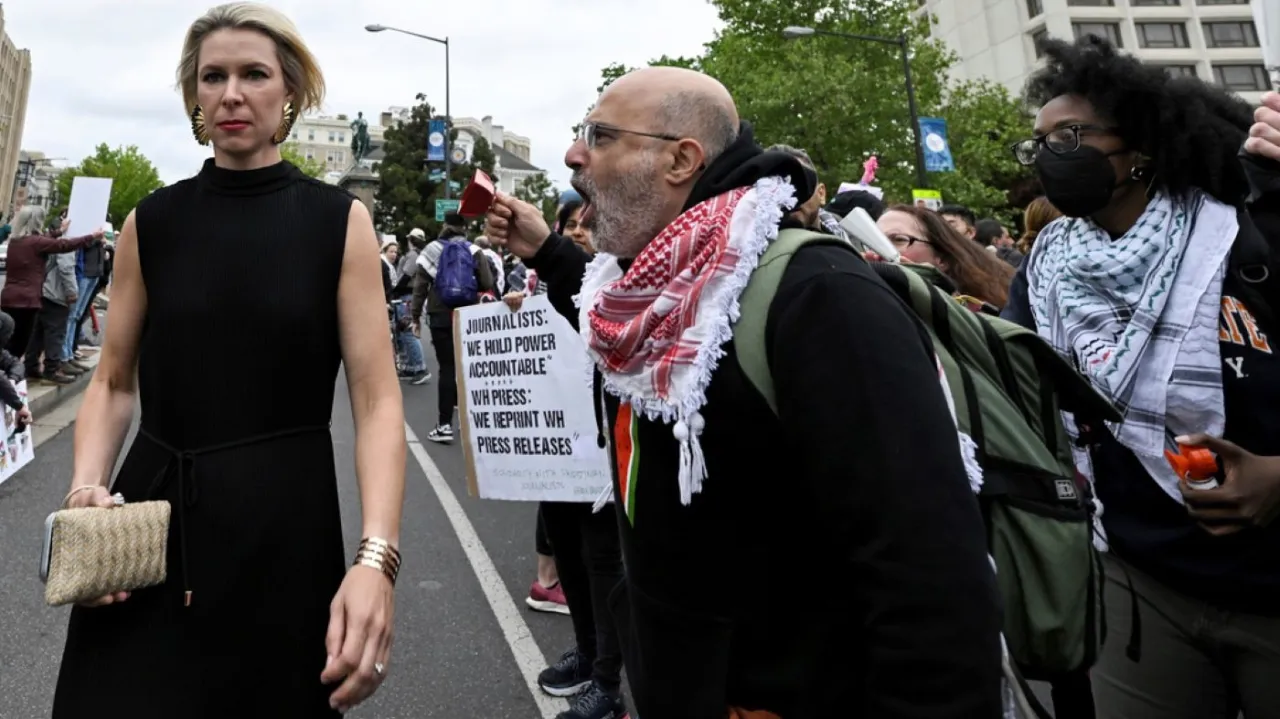As the evening progressed, tensions continued to escalate between the protesters and the attendees of the White House Correspondents’ Dinner. The pro-Palestinian demonstrators were determined to make their voices heard, and they were not willing to back down. They held signs with powerful messages, demanding justice for the innocent lives lost in Gaza and calling for an end to the Israeli occupation.
The media, usually focused on capturing the glamour and glitz of the event, found themselves torn between covering the protests and maintaining the traditional coverage of the dinner. Journalists were faced with a difficult decision – should they prioritize the conflict in Gaza or the festivities happening inside the venue?
Inside the ballroom, the atmosphere became increasingly tense as some attendees felt uncomfortable with the protests taking place just outside the doors. Whispers of discomfort and unease filled the air, creating a stark contrast to the usual laughter and applause that accompanied the President’s speech. It was clear that the war in Gaza had cast a somber shadow over the event.
As President Biden concluded his speech, the room fell silent. The weight of the conflict in Gaza hung heavily in the air, and the absence of any mention of it in the President’s remarks became a glaring omission. The audience, both inside and outside the venue, waited anxiously for a response, a gesture of solidarity, or even a recognition of the ongoing crisis.
However, as the night progressed, it became evident that the White House Correspondents’ Dinner was not the platform for addressing such a contentious and complex issue. The event, traditionally a celebration of journalism and the freedom of the press, had become entangled in the web of international politics.
The protests outside the venue continued late into the night, as the pro-Palestinian activists refused to let their voices be silenced. They were determined to raise awareness and demand accountability from those in power. The clash between the festive atmosphere inside and the passionate demonstrations outside served as a stark reminder of the stark realities that exist beyond the glamour and glitz of events like the White House Correspondents’ Dinner.

The challenges of balancing political satire with global crises are multifaceted and complex. In times of heightened tension and conflict, such as the war in Gaza, the role of satire becomes even more crucial. Satire has long been a tool used to critique and challenge those in power, shedding light on issues that may otherwise be overlooked or ignored. However, when faced with the gravity of a global crisis, there is a fine line to walk between providing comic relief and showing respect for the lives affected.
The White House Correspondents’ Dinner, with its long-standing tradition of humor and light-hearted banter, presents a unique challenge in this regard. It is an event that brings together politicians, journalists, and celebrities, providing an opportunity for them to come together and momentarily set aside their differences. It is a chance for self-deprecating humor and playful jabs at the political establishment. But when the world is grappling with a crisis like the conflict in Gaza, the question arises: can we truly find humor in the face of such devastation?
President Biden’s decision not to address the conflict in his speech at the White House Correspondents’ Dinner was a reflection of the delicate balancing act that must be performed in such situations. While it may have been seen by some as a missed opportunity to bring attention to the crisis, it can also be viewed as a recognition of the need to provide a moment of respite and levity. The President, like many others in attendance, understood that the event serves as a temporary escape from the weight of the world’s problems.
However, outside the venue, the voices of protesters could be heard, expressing their discontent with the lack of attention given to the Gaza conflict. To them, the absence of any mention of the crisis may have felt like a form of complicity, a failure to acknowledge the suffering and loss experienced by the people in the region. Their frustration is understandable, as global crises demand our attention and action.
Ultimately, the challenges of balancing political satire with global crises require careful consideration and empathy. Satire can be a powerful tool for social commentary and critique, but it must be wielded responsibly, especially in times of crisis. The White House Correspondents’ Dinner and similar events should strive to strike a balance between providing comic relief and acknowledging the pressing issues that affect us all. It is through this delicate balance that we can continue to engage in meaningful dialogue and work towards a better future.
The importance of addressing global crises

The tensions surrounding the war in Gaza at the White House Correspondents’ Dinner highlight the importance of addressing global crises, even in seemingly unrelated events. While the dinner is primarily a gathering for humor and light-hearted banter, it is essential to acknowledge the pressing issues that affect people’s lives.
Global crises, such as the conflict in Gaza, have far-reaching consequences and cannot be ignored. By addressing these issues, politicians and journalists can show their commitment to finding solutions and supporting those affected.
Events like the White House Correspondents’ Dinner provide an opportunity to bring attention to global crises and mobilize support for those in need. By using their platforms to raise awareness and advocate for change, politicians and journalists can make a meaningful impact.
Moreover, addressing global crises is not just a moral imperative but also a strategic move. In an interconnected world, the repercussions of a crisis in one region can quickly spill over into others. Therefore, it is in the best interest of all nations to work together and find solutions to these challenges.
Furthermore, global crises often exacerbate existing inequalities and injustices. They disproportionately affect vulnerable populations, including women, children, and marginalized communities. By addressing these crises, policymakers and journalists can ensure that the voices of those most affected are heard and their needs are met.
Additionally, addressing global crises can have positive economic implications. By resolving conflicts and promoting stability, countries can create an environment conducive to trade and investment. This, in turn, can lead to economic growth and prosperity for all parties involved.
In conclusion, the White House Correspondents’ Dinner was overshadowed by protests against the war in Gaza, highlighting the challenges of balancing political satire with global crises. The protests served as a reminder of the need for media coverage and representation of global conflicts, and the importance of addressing these issues even in seemingly unrelated events. By acknowledging and addressing global crises, politicians and journalists can demonstrate their commitment to finding solutions and supporting those affected. Moreover, addressing global crises is not just a moral imperative but also a strategic move with economic and social benefits. It is crucial for nations to come together, raise awareness, and work towards resolving these challenges for the betterment of all humanity.


















